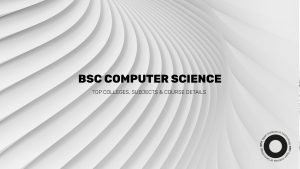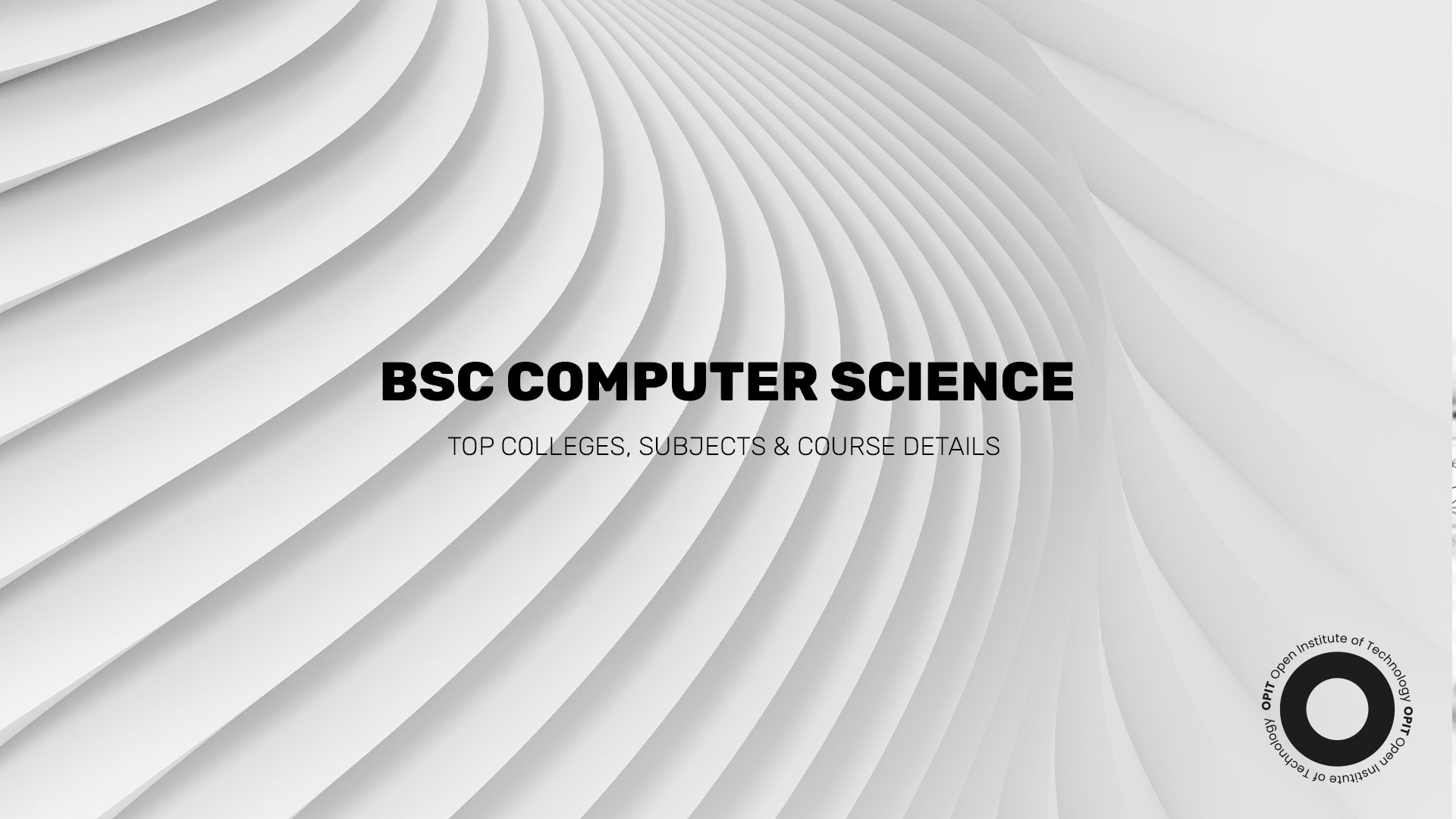

More than 53,000 degrees in computer science were pursued in the U.S. alone in 2020. The growth rate is 12%, and that percentage is only expected to rise. With computer science being the new trendy career path in 2023 and beyond, it’s logical to explore how a BSc in the field can help.
Whether you want to become a data analyst, web developer, network administrator or software engineer, a BSc Computer Science degree can help you kickstart a career in the ever-growing IT industry.
This article reviews BSc Computer Science subjects in each of the three years of the program, different computer science colleges, course details, and more.
What Are the Subjects in BSc Computer Science?
Most bachelor of computer science programs last three years. Below is an overview of the BSc Computer Science subjects you can expect to find in different educational institutions throughout the study.
BSc Computer Science Subjects 1st Year
BSc Computer Science subjects for first year answer the “What is BSc Computer Science” question in detail. The first year has entry-level programs that introduce the student to the world of computer science. In most colleges, you can attend these courses even if you have no experience in the field because they’re designed for beginners.
Colleges have different approaches when it comes to computer science program syllabi. OPIT is an example of a comprehensive program that offers diverse learning opportunities for students. Here are the BSc Computer Science subjects list for your reference:
- Technical English – Introduces students to basic terminology used throughout the course.
- Computer Networks – Helps students understand how computer networks function.
- Programming Principles – Students get to know how computers work and learn about basic programming tasks and concepts.
- Computer Architecture – Introduces students to computer systems, data movement, CPU, and other parts of hardware and software.
- Basic Math – Here the students receive all the knowledge in math they’ll need to build their analytical skills.
- Web Development – Students learn the science behind the internet, HTTP, and other markup languages.
BSc Computer Science Subjects 2nd Year
- Database Introduction – Basics of databases and their management systems.
- The infrastructure of Cloud Computing – Introduction to cloud computing, basic concepts, and important components.
- Programming Paradigms – Understanding how programming languages work.
- Business Strategy – Foundations of running a business in modern times.
- Introduction to AI – Introduction to the important concepts of AI so the student can understand how to use it.
- Introduction to Machine Learning – Taking the first steps toward machine learning projects.
- Cloud Development – Introduction and training to create cloud solutions.
- Digital Marketing – Better understanding of the ins and outs of online marketing and its key concepts.
- Introduction to Computer Security – Cryptography and other cyber security aspects so the student is aware of common threats and how to solve them.
BSc Computer Science Subjects and Electives 3rd Year
In the third year of BSc Computer Science, you can choose electives depending on your interest. Some subjects you can expect to find include:
- Cybersecurity – Further education in cybersecurity across systems.
- Parallel and Distributed Computing – How to create parallel and distributed apps.
- Machine Learning – A deeper focus on machine learning and the development and training of computer systems required for the projects.
- Computer Vision – Teaches how computers can read and analyze visual content.
- Cloud Computing Automation and Ops – A popular specialization, cloud computing automation and ops takes the cloud field more seriously and teaches how to automate tasks.
- Front-End Programming – This subject focuses on markup languages, libraries, frameworks, and other platforms needed to build websites.
- Mobile Programming – Creation of apps for Android and iOS mobile devices.
- Software Engineering – In-depth education in creating, designing, and maintaining software.
- Computer Science and AI Ethics – Learning how to use computer science ethically and legally.
- Game Development – Basics of game design, mechanics, interfaces, and more.
Top BSc Computer Science Colleges
If you want to study computer science at the college level, you can explore different traditional and modern programs.
- Stanford’s Bachelor of Science in Computer Science – Full-time, four years, on campus, in English. A multidisciplinary approach with different levels is available to fit students of different skills.
- East Central University Online Bachelor of Science in Computer Science – Full/part-time, two years, remote learning in English. The curriculum follows Association for Computing Machinery guidelines.
- Methodist University Online BSc in Computer Information Technology – Full/part-time, 42 months, remote learning, in English. Offering Cybersecurity and Business Information Systems specializations.
- The Global American University, BSc in Computer Science – Full-time, four years, on-campus, in English. The overall course is in math, computing, and data analysis.
- Concordia University’s BS in Computer Science – Full/part-time, eight weeks, remote learning in English. Introduction to the technology career with hands-on practice.
- Ambrose University’s Bachelor of Science in Computer Science – Full-time, four years, campus learning in English. Focus on computer architecture, application development, and software engineering.
- Opit’s Bachelor in Modern Computer Science – Self-paced, three years, online, in English. Comprehensive syllabus based on theory and hands-on practice.
Factors to Consider When Choosing a College
- The College Curriculum – The program shouldn’t be based on outdated textbooks. Rather, it should be flexible and up to date with current software design trends. The problem with traditional learning systems is that they’re mostly based on old information and materials that don’t equip students with functional knowledge.
- Reputation – The college must have a stellar reputation, easy access to the list of professors, and their publications in peer-reviewed journals.
- Required Equipment – Ensure you can afford or have access to the necessary equipment to attend the courses, especially if you consider remote learning. See whether any equipment is included in the tuition.
- Syllabus – The BSc computer science syllabus needs to contain a variety of subjects (like those mentioned above) and not only focus on one or two hard skills or theories. The curriculum should be future-proof and focused on more than just the current needs of the industry.
- Alumni Experience – Explore how college alumni are doing and find examples of their work online.
- Internship Opportunities – Does the college you like also provide internships? If not, does the curriculum offer enough hands-on practice?
- Cost – Last but not least, consider the cost of the program. Weigh up the pros and cons of each college and use your budget to make the final decision. Does the college you want to attend offer financial aid?
BSc Computer Science Course Details
BSc Computer Science duration, fees, and eligibility criteria are other important factors to consider before applying for a program.
Course Duration
A typical course duration for BSc Computer Science is two to three years. Some three-year programs offer a fast-track option allowing you to complete the degree in two years. The course duration plays an important role when planning your studies, especially if you choose the traditional learning method.
Course Fees
Bachelor of Science programs in Computer Science differ in pricing. The fees can depend on several factors:
- Reputation
- Location
- College experience
- Learning facilities
- Availability of scholarships
The most sensible approach is to compare the course fees and programs of multiple BSc Computer Science colleges so you can pick the best option that matches your budget and learning goals.
Eligibility Criteria
Different courses and universities offer different eligibility criteria. Most require completion of a 10+2 or similar science stream examination. Some colleges may include a qualifying examination or pre-entry exams. Contact the college you’re interested in attending to get detailed information about their eligibility criteria.
Many online degree programs like OPIT only offer requirements like English proficiency (B2 and higher), a high school or undergraduate degree, or previous work or education experience for credit transfer.
You can find eligibility criteria on the official website of the college in which you’re interested.
Career Opportunities After BSc Computer Science
Almost every industry deploys technology in one way or another, which means that skilled IT professionals are in high demand. With career opportunities everywhere, it’s no wonder the number of computer science students grows exponentially each year.
A Bachelor of Science in Computer Science unlocks the doors to some of today’s best-paid and in-demand jobs. They include, but aren’t limited to the following fields:
- Data Science
- Software Development or Engineering
- App and Game Development
- Web Development
- Database Architecture
Importance of Specialization in the Field
Computer science is a broad field. From building applications to analyzing data to providing security for software and companies, there are tons of specializations to choose from. Here’s why it’s important to pick one field of specialization:
- You get to acquire deep knowledge about your field of interest.
- You become more competitive and have a higher chance of finding a job to your liking.
- You unlock new research opportunities.
- You can advance in your field of specialization and come up with innovative solutions.
Skyrocket Your Career With BSc Computer Science Programs
Pursuing a BSc Computer Science degree will help you unlock numerous rewarding career opportunities with a high-income potential. You also get to be a part of a fast-developing field with unlimited prospects for further development and growth.
Choosing a reputable college and the right bachelor of computer science subjects will help ensure you make the most of your learning experience and will put you on the right track to becoming a successful IT professional.
Have questions?
Visit our FAQ page or get in touch with us!
Write us at +39 335 576 0263
Get in touch at hello@opit.com
Talk to one of our Study Advisors
We are international
We can speak in:




